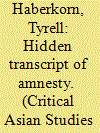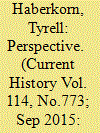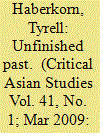|
|
|
Sort Order |
|
|
|
Items / Page
|
|
|
|
|
|
|
| Srl | Item |
| 1 |
ID:
139443


|
|
|
|
|
| Summary/Abstract |
There were two, not one, amnesty laws passed in relation to the 6 October 1976 massacre at Thammasat University and coup in Thailand. The first amnesty law, passed on 24 December 1976, legalized the coup and prevented those who created the conditions for the coup and seized power on the evening of 6 October from being held to account. The second amnesty law, passed on 16 September 1978, freed eighteen student activists still undergoing criminal prosecution and dismissed the charges against them. Although neither amnesty mentioned the massacre, the urgency of producing and then safeguarding impunity for the state and para-state actors behind the violence at Thammasat was the absent presence in both laws. Combining a close reading of both laws with examination of archival documents about the drafting of the first amnesty law and court and other records related to the second, this article uncovers the hidden transcripts of both amnesty laws as a point of departure for examining questions about impunity, law, and history. First, what are the legal mechanics through which violent actors escape accountability? Second, what are the legal and political functions of amnesty when no crime has been committed? Third and finally, might accountability for past violence be possible, and if so, under what conditions? The answers to these questions illuminate how impunity was produced in the specific case of the 6 October 1976 massacre in Thailand as well as address broader concerns about impunity's role in state formation.
|
|
|
|
|
|
|
|
|
|
|
|
|
|
|
|
| 2 |
ID:
140644


|
|
|
|
|
| Summary/Abstract |
Under cover of ambiguous pledges of reform, General Prayuth Chan-ocha and his junta, the National Council for Peace and Order (NCPO), have created the most repressive regime in Thailand since a period of military rule inaugurated by an October 1976 massacre and coup. Prayuth’s seizure of power, launched on May 22, 2014, was the twelfth successful coup since the end of the absolute monarchy in 1932. The 2007 constitution (the country’s eighteenth) was abrogated overnight, martial law put in place, and the jurisdiction of the military courts extended to civilians for crimes against the crown and state. Now, more than a year after the coup, martial law has been revoked but there is no clear sign of either a new constitution or an election.
|
|
|
|
|
|
|
|
|
|
|
|
|
|
|
|
| 3 |
ID:
087031


|
|
|
|
|
| Publication |
2009.
|
| Summary/Abstract |
This article examines the struggle for land tenancy reform and the assassination of Farmers' Federation of Thailand (FFT) leaders in northern Thailand during the period of democratic politics between 14 October 1973 and 6 October 1976 as unresolved, ambiguous, and linked events in the recent Thai past. During the 1973-1976 period, farmers became new political and legal subjects as they fought to pass and then implement the 1974 Land Rent Control Act. Drawing on provincial archival records, the author contextualizes how and why tenancy became a contentious issue between farmers and landlords beginning in the 1950s and then examines the anxious and violent backlash with which their organizing in the 1970s was met by state, para-state, right-wing, and landholding elites. The author interrogates the conditions and effects of the assassinations by writing about the life and death of one of the leaders of the FFT, Intha Sribunruang. The denials by a range of state officials of the political nature of Intha and other FFT leaders' murders underscore both the importance of the FFT's work and the necessity to critically evaluate the assassinations. The author concludes by arguing that the lack of resolution surrounding the struggle for tenancy reform and the assassinations of FFT leaders continues to resonate in present-day politics. An Appendix to the article offers the first English-language list of the FFT leaders known to have been killed or victimized by violence between 1974 and 1979.
|
|
|
|
|
|
|
|
|
|
|
|
|
|
|
|
|
|
|
|
|